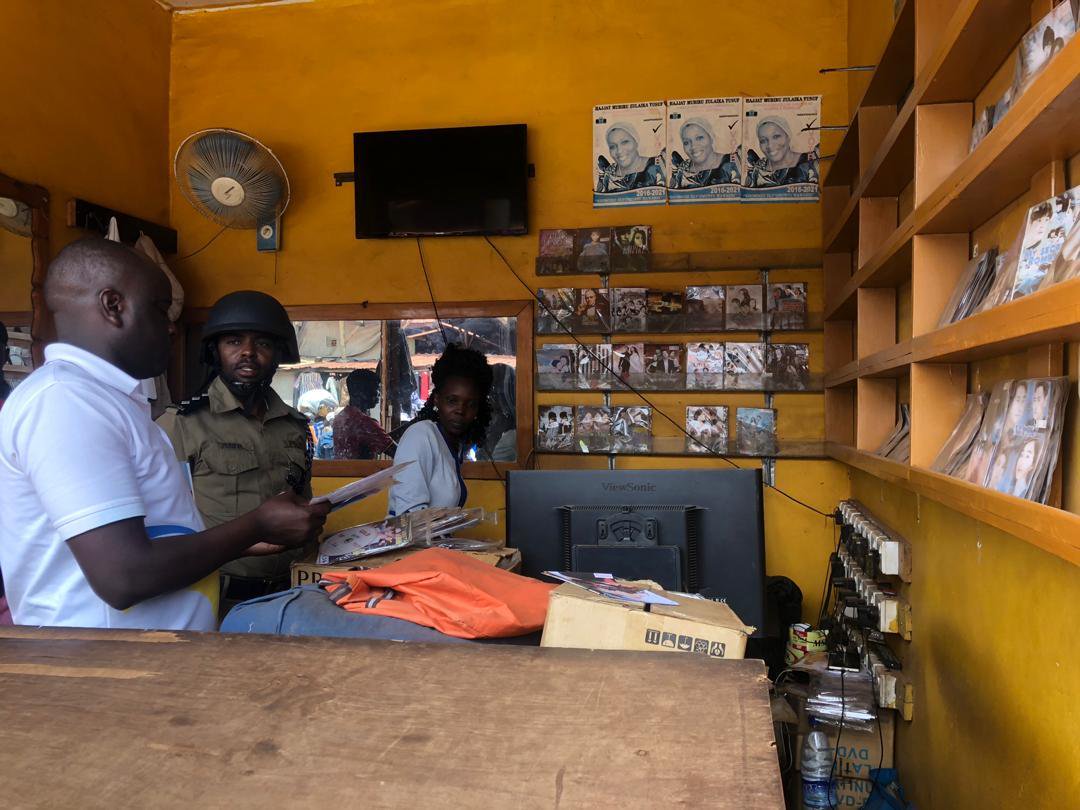
KAMPALA —Intellectual property (IP) is back in focus as Uganda Federation for the Movie Industry (UFMI) slaps wide-ranging regulatory sanctions on movie library owners and vendors for allegedly stealing and eroding the firms’ competitive edge.
The Uganda Registration Service Bureau (URSB) the industry regulator has since backed UFMI, also announcing a number of sanctions on IP thieves, accusing vendors of stealing UFMI intellectual property and other rights.
To grasp what is at stake, one needs to understand what intellectual property really is.
“Intellectual property refers to creations of the mind: inventions; literary and artistic works; and symbols, names and images used in commerce,” according to the World Intellectual Property Organization, an intergovernmental body set up to promote the protection of IP worldwide.
That means if a person or a company comes up with a new idea or product, or a process that offers a new way of doing something, then they are granted an exclusive right over the use of their creation for a certain period of time.
IP rights are generally enforced by granting patents, trademarks and copyrights to the originators of innovative ideas.
The URSB says these creative works include but are not limited to books, cinematography or films, music, computer programs among others otherwise known as the creative industry.
In this regard, URSB has a statutory obligation towards regulating activities in the creative industry.
For this industry to thrive, URSB says there are three fundamental pillars that must exist; legislation, collective management and enforcement.
The regulator has previously been engaged in enforcement drives relating to Intellectual Property particularly, copyright, a move that has attracted mixed feelings and reactions about these enforcement activities especially on social media but URSB as the regulator says it is under obligation to ensure transparency, accountability and good governance among the CMOs and to take the lead on effective enforcement measures to counter piracy.
Its has also announced that it has as such appointed Caretakers to oversee the management of Uganda Performing Rights Society (UPRS), and that it currently restructuring and re-organizing of Uganda Federation for the Movie Industry (UFMI) and will continue to carry out enforcement operations to stop piracy in Uganda.

URSB has also called upon the public to join in this fight against piracy/theft of intellectual property.
A much broader debate about IP rights has been taking place across the world over the past several decades.
Intellectual property is one of the most contentious issues in global economic policymaking, and it elicits strong passions among various stakeholders.
Supporters of strong IP protections argue that they are needed to foster innovation and promote creativity, by ensuring that the economic rewards of innovation go to the innovator.
They stress that the absence of such protection allows imitations and counterfeits to threaten and outperform original products.
This, in turn, undermines the willingness of companies and individuals to invest in new ideas and products, thus undercutting innovation and economic development.
Critics, however, stress that excessive and broad IP protections have the potential to hamper innovation and constrain competition.
Problems also arise when companies try to unreasonably prolong patent protections or aggressively expand the coverage of existing patents by exploiting legal loopholes, in a bid to prevent competition.
Furthermore, opponents contend that IP rights favor the world’s rich, idea-exporting, patent-holding countries over the poor.
==================================================================
See full statement
ENFORCEMENT ON COPRIGHT & RELATED RIGHTS FOR FILMS
URSB’s position on the enforcement of copyright and related rights for film and audio visual works
Uganda Registration Services Bureau is the National Intellectual Property Office and the National Information Center for Copyright.
As part of our mandate, we administer the Copyright and Neighbouring Rights Act, 2006 and it’s implementing Regulations (the Copyright and Neighbouring Rights Regulations of 2010).
The Act provides for protection of literary, artistic and scientific works and their neighboring rights.
These creative works include but are not limited to books, cinematography or films, music, computer programs among others otherwise known as the creative industry.
In this regard, URSB therefore has a statutory obligation towards regulating activities in the creative industry.
For this industry to thrive, there are three fundamental pillars that must exist; legislation, collective management and enforcement.
The Copyright Law
Copyright is the right given by law to the creators of literary, dramatic, musical and a variety of other works of mind and the Copyright and Neighbouring Rights Act, 2006 gives the creator of a work such as music, film or movie an exclusive right to use that work to the exclusion of others.
Copyright holders can grant others permission to use their works through licenses and assignments. The law further provides for criminal, civil and administrative sanctions in respect to copyright and neighbouring rights infringement and piracy.
Copyright Piracy
Piracy means unauthorized reproduction, importing or distribution of works protected by copyright.
Therefore the author/owner of a copyrighted work, enjoys certain exclusive rights with respect to his or her works. These include right to reproduce, to publish, to adopt, to translate and to perform in public.
The owner can also sell, assign, license or bequeath the copyright to another party if he/she wishes so.
If any person other than the copyright owner or his/her authorised agent undertakes any of the above-mentioned activities with respect to a copyrighted product, it amounts to infringement of the copyright.
Piracy typically takes the form of reproduction of entire works: books, CDs and DVDs for sale in the market in competition with original works. Copyright piracy is thus like any other theft which leads to loss of incentives to the owners of the property, causes economic loss and cripples the creative industry which undermines the very foundation of national creative industries, as it is very difficult to compete with the pirated works.
Copyright and the role of Collecting Management Organisations (CMOs)
A CMO is an organization that is entrusted with the responsibility of managing copyright and related rights on behalf of the rights holders who subscribe as members. URSB has the mandate under Section 57 of the Copyright and Neighbouring Rights Act to license CMOs. Currently Uganda has three (3) CMOs namely; Uganda Reproduction Rights Organization (URRO) for print and publishing of books, Uganda Performing Rights Society (UPRS) for works related to music, Uganda Federation of Movie Industry (UFMI) for works related to films and audio visual fixations.
The main role of these CMOs is to license users of copyright and related rights, collect and distribute royalties. CMOs also engage in enforcement of their members’ rights.
A security device is a legal requirement
A security device means an adhesive label, banderol or hologram.
Regulation 19 of the Copyright and Neighbouring Rights Regulations, 2010 requires a security device to be affixed to each and every sound recording or audio visual recording which is distributed or otherwise exposed to the public for sale, hire or rental, within Uganda.
Regulation 20 gives the mandate to a Collecting Society to issue security devices.
Regulation 22 provides that films or movies either imported or distributed, offered or exposed to the public for distribution by way of sale, hire or rental within Uganda without a security device are considered as copies infringing copyright and may be seized by an inspector or a police officer.
Further Section. 81 provides for reciprocal protection of a copyright holder who is not a citizen or resident of Uganda if the work was first published in a country which is a member of any of the organisations specified in Part I of the Second Schedule to the Copyright and Neighbouring Rights Act, 2006 namely; World Intellectual Property Organisation (WIPO), African Regional Intellectual Property Organisation (ARIPO), United Nations Educational Scientific and Cultural Organisation (UNESCO) and World Trade Organisation (WTO) or a signatory to The Trade Related Aspects of Intellectual Property Rights Agreement (TRIPS Agreement).
Most of the foreign movies on the market do not have a security device and they are reproduced without the authorization of the copyright holder or the agent and this has created unfair competition for the industry and affected its growth.
The rights holders have no incentive to keep creating and improving their work while pirates are benefitting.
Enforcement of Copyright Infringement
URSB has therefore been engaged in enforcement drives relating to Intellectual Property particularly, copyright. However, this has attracted mixed feelings and reactions about these enforcement activities especially on social media.
URSB as the regulator is under obligation to ensure transparency, accountability and good governance among the CMOs and to take the lead on effective enforcement measures to counter piracy and has as such appointed Caretakers to oversee the management of Uganda Performing Rights Society (UPRS), is currently restructuring and re-organizing of Uganda Federation for the Movie Industry (UFMI) and will continue to carry out enforcement operations to stop piracy in Uganda. URSB calls upon the public to join in this fight against piracy/theft of intellectual property.







